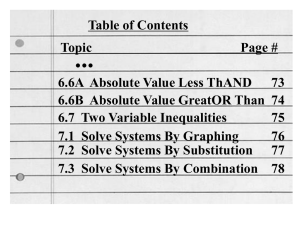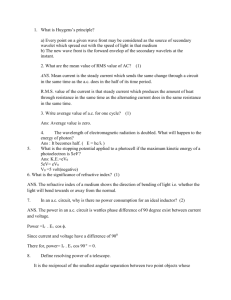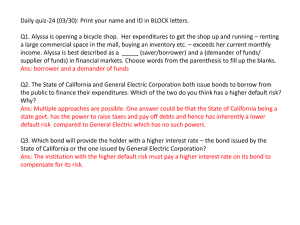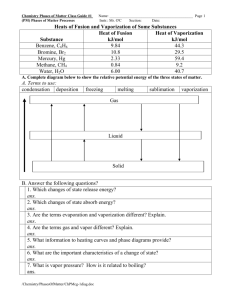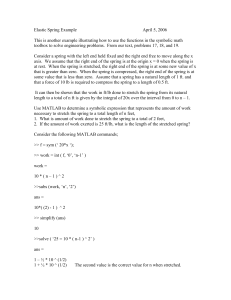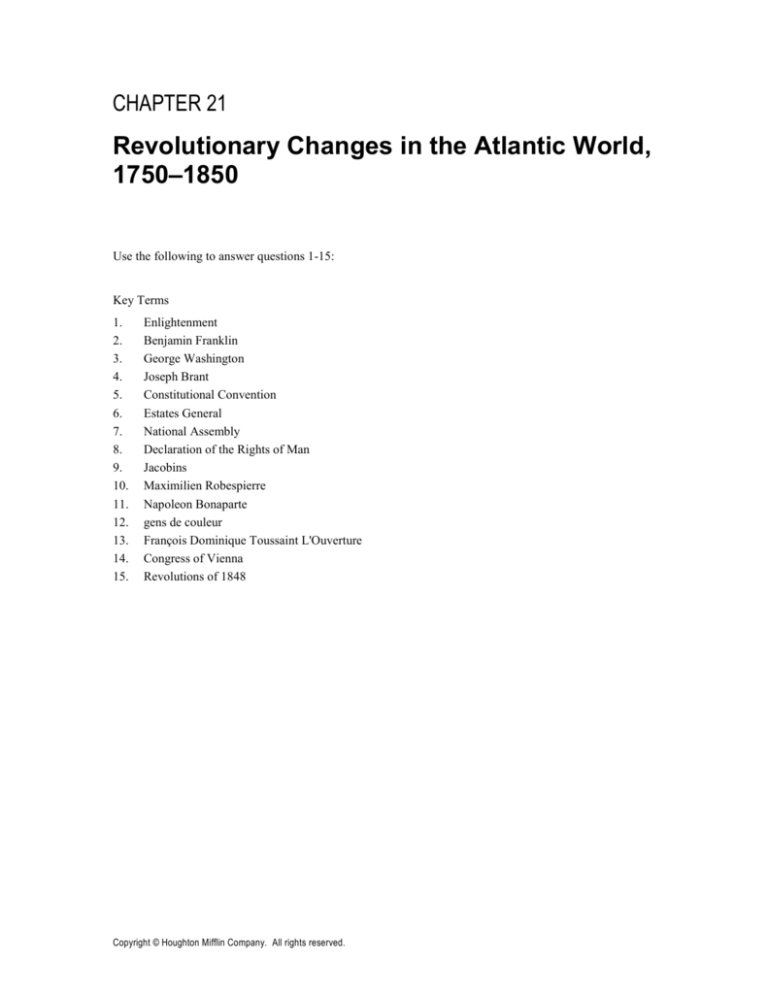
CHAPTER 21
Revolutionary Changes in the Atlantic World,
1750–1850
Use the following to answer questions 1-15:
Key Terms
1.
2.
3.
4.
5.
6.
7.
8.
9.
10.
11.
12.
13.
14.
15.
Enlightenment
Benjamin Franklin
George Washington
Joseph Brant
Constitutional Convention
Estates General
National Assembly
Declaration of the Rights of Man
Jacobins
Maximilien Robespierre
Napoleon Bonaparte
gens de couleur
François Dominique Toussaint L'Ouverture
Congress of Vienna
Revolutions of 1848
Copyright © Houghton Mifflin Company. All rights reserved.
184
Chapter 21: Revolutionary Changes in the Atlantic World, 1750–1850
16.
Defend the proposition that the Enlightenment represents more than an intellectual phenomenon. Trace the
roots of the Enlightenment, and explain why and how it manifested itself in a revolutionary tradition.
Ans: Students should be able to analyze how political rhetoric and intellectual ideas furthered humanism,
the Renaissance, and the Scientific Revolution. In the same way that earlier intellectual “revolutionaries"
such as Galileo, Copernicus, Newton, and Liebniz had dramatically changed the world's ide of the church
as the center of life, the Enlightenment's focus on creating a better world for humankind was led by radical
ideas that challenged the traditional autocratic and absolutist power of the state, the monarchy, and
aristocratic society. Descartes, Hobbes, Locke, and Rousseau examined the relationship of people to the
government. These ideas were first transformed into a political revolution when the United States
challenged the autocracy of Britain. This example of a successful revolution and the establishment of a new
republic with a democratic government served as a model for France thirteen years when revolutionaries
tried to effect changes to the absolutist reign of Louis XVI. Instead, however, this revolution led to the
Terror.
Students should use this question as an opportunity to examine the ideas of the Enlightenment. As was
discussed in previous chapters, the Enlightenment emerged out of the Scientific Revolution. Enlightenment
thinkers began to use reason and rational inquiry to examine the nature of society and therefore began to
question the efficacy of the leadership of the nobility, monarchy, and the church. Students should describe
the ideas of John Locke and Rousseau: the notions of natural rights, government as an instrument of the
people's will, and the right to rebellion. The high literacy rate of the West allowed these ideas to spread,
and they became particularly familiar to the middle class through newspapers and essays by various
thinkers. The popular protest of the eighteenth century was inspired in large part by these new ideas and the
growing discontent of the population.
17.
Describe the major wars fought among European imperial powers in the seventeenth and eighteenth
centuries, and identify the major consequences of these wars.
Ans: Students should identify the colonial wars beginning in the seventeenth century, when the Netherlands
attacked Spanish and Portuguese colonies worldwide. Great Britain also raided Spanish and Portuguese
colonies, gaining a foothold overseas. The British then attacked the Dutch, whose waning influence drew
Britain and France into a struggle for power and control. In the eighteenth century, the War of Spanish
Succession brought all of the major powers into conflict, as did the War of Austrian Succession a few
decades later. Another series of wars between France and Britain culminated in the Seven Years War,
which ended in 1763. When that war ended, Britain had gained control of all the French holdings in North
America and most of French territory in India. Even though the economies of European countries were
expanding because of the early stages of the Industrial Revolution, the extensive colonial wars created an
enormous fiscal crisis. The problems generated by that fiscal crisis helped spark the revolutionary era.
18.
After defeating the French in North America in 1763, what two major problems did the British face with
respect to the American colonies?
Ans: First, the possibility of armed conflict between colonists and Native Americans threatened to bankrupt
the British government, which was already heavily in debt from European and colonial wars. Britain simply
could not afford to defend the American colonies as adequately as the colonists demanded, if they continued
to settle Amerindian land and provoke wars. In response, Britain passed the Proclamation of 1763, which
was supposed to prohibit colonists from crossing the Appalachian Mountains into Indian territory. The act
was flouted quite openly by colonists, who viewed it as a repressive measure. The second major problem
directly addressed financial matters—specifically how to get the colonists to pay more of the expenses of
governing and protecting them. Students should identify several of the many taxes imposed on colonists
toward this end, including the Sugar and Currency Acts of 1764, the Stamp Act of 1765, and the Townsend
duties in 1767. The result of those acts was the strengthening of colonial resolve, the unification of the
formerly fragmented colonies in their common protest against perceived British oppression, and ultimately
rebellion and revolution.
Copyright © Houghton Mifflin Company. All rights reserved.
Chapter 21: Revolutionary Changes in the Atlantic World, 1750–1850
185
19.
The armed forces of the American colonists were small, poorly equipped, and often poorly led. How were
those colonists able to defeat Great Britain, which ranked as one of the foremost military powers in the
world at that time?
Ans: A wide variety of factors contributed to the American victory. British lines of communication and
supply stretched across the ocean, whereas the colonists were fighting in their own backyards. New recruits
and supplies for the Americans were close at hand. Although the British won most of the battles, the
colonists were able to win a few key victories, such as the battle at Saratoga, New York. That victory was
important because it brought the French into the conflict on the Americans' side. Without the French, the
Americans probably could not have won the war. The French supplied arms, powder, and cannon, in
addition to many soldiers, advisers, and fleets of warships, which turned the tide against the British. Also
significant was the debate within the British government and among the British public over the conduct of
the war. The British received very little encouragement and much hindrance in their prosecution of the war.
Finally, British indecision and ineptitude often made it difficult to pursue effective policies.
20.
What was the nature of the fiscal crisis that triggered the French Revolution?
Ans: The expenses of a long series of European wars, beginning with the War of Austrian Succession
(1740-1748), initiated the fiscal crisis. King Louis XV was rebuffed in his attempts to repeal tax exemptions
for some favored groups. The Seven Years War (1756–1763) exacerbated the situation. King Louis XVI was
warned that the government's finances were stretched thin, but he plunged France into the American
Revolution anyway. Renewed attempts to increase the nobility's taxes met with frustration and political
maneuvering by each side. When Louis called a meeting of the Estates General for the first time in 163
years, the opportunity existed for a combined front to resist governmental power and institute a
constitutional monarchy. Besides the fiscal crisis within the French government, there was a growing crisis
within French society. The nation's poor were a large, growing, and troublesome sector. The poverty of
peasant families forced younger children to seek seasonal work away from home and led many to crime and
beggary. The urban streets swarmed with beggars and prostitutes. The wretchedness of the French poor is
best indicated by the growing problem of child abandonment. Unable to afford decent housing, obtain
steady work, or protect their children, the poor periodically erupted in violent protest. In the countryside
violence was often the reaction when nobility and clergy increased dues and fees. In towns and cities an
increase in the price of bread often provided the spark. A succession of bad harvests propelled bread prices
upward and provoked an economic depression as demand for nonessential goods collapsed. By the time of
the Revolution, nearly a third of the Parisian work force was unemployed. Thus the rebellion of the French
nobility--their greed and unwillingness to submit to higher taxes--was most immediately responsible for the
Revolution, and the Third Estate joined in because it was already overburdened with taxes and in the midst
of an economic depression.
21.
Why was Napoleon's reign so popular with the French? How did the extension of Napoleon's empire lead to
the Congress of Vienna?
Ans: Napoleon was popular with the people of France for his defense of the republic and his extension of
the war into Europe against those who sought to restore the monarchy (notably Austria and Prussia). He
was also quite popular with the people for his role in stopping the abuse of power among the Directory, as
well as for his military expeditions to the East. This gave him a platform on which to place himself as
emperor in 1804, and he continued to maintain popular support through his implementation of public works
programs and his overhaul of the legal system to promote equality under the law and protection of property
rights. He appealed to the conservative orders because he supported the church and reestablished order in
a chaotic world. In short, by appealing to all classes in a society turned upside down by revolution and lack
of political cohesion, he was able to assume power as a dictator. His plans to extend the empire of France
across Europe, however, gained him enemies throughout Europe, and a number of alliances against him
were formed to try to rein him in, most notably by England, Russia, Prussia and Austria. Because these
countries had experience in forming coalitions against Napoleon after his defeat at Waterloo, they found it
was in their best interest to form a cooperative organization to restore monarchical and conservative
political order to Europe.
Copyright © Houghton Mifflin Company. All rights reserved.
186
Chapter 21: Revolutionary Changes in the Atlantic World, 1750–1850
22.
What were the causes of the revolution in Saint Domingue?
Ans: The foundation for the Haitian Revolution lay in the racism and brutality of slavery and the plantation
system. The number of African-born slaves, as opposed to those born in Haiti, was a significant factor as
well. The event that triggered the revolution was the revolutionary turmoil in France. Wealthy planters,
poor whites, and the gens de couleur sent representatives to Paris to argue their points of view in the new
legislative bodies. As the struggle for control between those groups within Haiti intensified, violence broke
out. Violence first divided gens de couleur and whites, and then a separate slave rebellion broke out in the
north. Slaves gained strength when the radical National Convention in France outlawed slavery in 1793.
The efforts of the plantocracy to continue slavery ensured that the general melee would turn into a struggle
of slaves for their freedom.
23.
The Enlightenment as a social and intellectual movement impacted many segments of society. How did this
movement affect women in the elite and common classes during the revolutions?
Ans: In England, educated middle-class women purchased and discussed the books and pamphlets of the
era. Some also contributed to the era's intellectual life by raising the issue of the rights of women. In Paris,
wealthy women made their homes centers of debate, intellectual speculation, and free inquiry. Their salons
brought together philosophers, social critics, artists, and members of the aristocracy and commercial elite.
Women were powerfully affected by their participation in revolutionary politics, which in part resulted from
Enlightenment thinking. Before the American Revolution women led boycotts, and during the war they
organized relief and charitable organizations. Nevertheless, they were denied political rights in the new
republic. During the French Revolution, working-class and poor women were particularly affected by the
prewar economic crises. French women faced the difficulties of feeding their families while facing high
bread prices, and they were also affected by the economic depression, which hit garment and other small
businesses hard. Market women organized a crowd of thousands to march to Versailles. Once there, they
forced their way into the National Assembly to demand action. Therefore, the Enlightenment impacted
women of both the elite and the poorer classes. Women of the elite participated in the debates and
dissemination of Enlightenment thought, whereas poor women took Enlightenment inspiration to organize
protests and boycotts. Unfortunately, their interest and participation were not recognized by their
governments in the aftermath of the revolutions. Both elite and common women remain disenfranchised by
the new constitutional governments in France and the United States until the twentieth century.
24.
What role did the Congress of Vienna play in restoring political stability to Europe in the post-Napoleonic
era? How did it relate to the philosophical ideas of the Enlightenment?
Ans: Students should examine the irony that, despite the conservative retrenchment after the French
Revolution, popular support for democratic reform and self-determination spread throughout Europe. The
Congress of Vienna took place in 1814–1815 as a response to the upheaval faced by the monarchies,
nobility, and the church. The objective of the Congress of Vienna was to restore the French monarchy, to
repress nationalist and liberal ideas, and to stem the tide of revolution elsewhere. Despite these efforts by
this “Holy Alliance” of European leaders, the powerful ideas of liberalism and democracy grew. Students
should discuss examples: the Greeks pushed for independence from the Ottoman Empire, in the United
States voting rights were extended to all white males, and in Great Britain reformers called Chartists
worked for voting and labor reform. Reformers in Italy, Hungary, and Bohemia also pressed for national
self-determination.
25.
What newly independent country began an assault on the American and Asian colonies of Spain and
Portugal in the early 1600s?
Ans: Netherlands
26.
Which of the following was not one of the major eighteenth-century wars in Europe?
A) War of Spanish Succession
B) Thirty Years War
C) War of Austrian Succession
D) French and Indian War
E)
Seven Years War
Ans: B
Page: 591
Copyright © Houghton Mifflin Company. All rights reserved.
Chapter 21: Revolutionary Changes in the Atlantic World, 1750–1850
187
27.
The Enlightenment was the intellectual movement in which
A) the methods and questions of the Scientific Revolution were applied to human society.
B) the methods and questions of the Confucian examination system were applied to society.
C) the methods and ideology of the Protestant Reformation were applied to society.
D) the ideas of the Renaissance were applied to society.
E)
the ideas of the absolutist rulers were applied to society.
Ans: A
Page: 592
28.
Which of the following would John Locke have argued?
A) The king is appointed by the divine will of God, and people have to respect that.
B) Individual rights can only be guaranteed by an absolute ruler whose power is unchecked by the
populace.
C) People have the right to rebellion.
D) The abolition of private property is necessary for the harmonious functioning of society.
E)
Democracy does not work because not all people are equal or should be a part of the working
government.
Ans: C
Page: 592
29.
One of Rousseau's most radical ideas was that government
A) could not impose unwanted taxes.
B) authority rested on the consent of the governed.
C) had to respond to calls for reform.
D) was responsible for controlling business.
E)
should be abolished.
Ans: B
Page: 592
30.
What were the goals of monarchs such as Catherine the Great of Russia and Frederick the Great of Prussia
in supporting the Enlightenment?
A) They protected religious institutions from new ideas.
B) Expansion of royal authority over localism, religious institutions, and the nobility
C) They firmly reinforced the rights of feudal lords.
D) They secured the social order in favor of the nobility.
E)
They favored a monopoly on joint-stock companies.
Ans: B
Page: 592
31.
Napoleon’s plans for European conquest were held in check by the naval supremacy of
A) Britain.
B) the Netherlands.
C) France.
D) Spain.
E)
Portugal.
Ans: A
Page: 608
32.
Women helped disseminate new political ideas by
A) purchasing and discussing books of the era.
B) contributing as writers and commentators.
C) bringing together thinkers in their homes, or salons.
D) raising the argument for women's rights.
E)
All of these
Ans: E
Page: 593
33.
The Enlightenment's intellectual ferment most deeply influenced the
A) upper class.
B) poor.
C) nobility.
D) clergy.
E)
middle class.
Ans: E
Page: 593
Copyright © Houghton Mifflin Company. All rights reserved.
188
Chapter 21: Revolutionary Changes in the Atlantic World, 1750–1850
34.
To European intellectuals, Benjamin Franklin showed that America was
A) unsuitable for further colonization.
B) breeding experimenters rather than intellectuals.
C) a particularly healthy environment for genius.
D) the home of second-rate intellectuals.
E)
provincial and backward.
Ans: C
Page: 593
35.
The salon was
A) a fashionable dinner club with music and gambling.
B) a private venue for discussing intellectual ideas.
C) an underground radical organization plotting the overthrow of the ancient regime.
D) a Parisian boutique frequented by Marie Antoinette.
E)
where King Louis XVI met with his ministers.
Ans: B
Page: 593
36.
In the eighteenth century, the common people of Europe sometimes expressed outrage over
A) the granting of the right to vote to women.
B) violations of popular customs.
C) the failure of European monarchs to proceed quickly with reforms.
D) African slavery.
E)
the price of artwork.
Ans: B
Page: 594
37.
What two related problems did the British face after defeating the French in 1763?
A) Slave revolts and declining price of cotton
B) Limiting settlement in Amerindian lands and imposing taxes
C) Women's suffrage and a heavily armed populace
D) Amerindian rights and environmental pollution
E)
Limiting immigration and overseas entanglements
Ans: B
Page: 595
38.
The Albany Congress in 1754 met to
A) write the Declaration of Rights and Grievances.
B) protest the Navigation Acts.
C) give support to the French during the French and Indian War.
D) coordinate a defense policy among colonists toward Amerindians and the French.
E)
throw tea into Boston Harbor.
Ans: D
Page: 593
39.
Which Amerindian chief drove the British from some western outposts at the end of the Seven Years War?
A) Crazy Horse
B) Lenape
C) Pontiac
D) Chief Sitting Bull
E)
Geronimo
Ans: C
Page: 595
40.
The Proclamation of 1763 and the Quebec Act of 1774 were intended to
A) keep colonists from taking Amerindian land by slowing settlement.
B) address problems of colonial representation.
C) keep the colonists from complaining about taxes.
D) acquire more territory for the Crown.
E)
annex Canada to the United States.
Ans: A
Page: 595
Copyright © Houghton Mifflin Company. All rights reserved.
Chapter 21: Revolutionary Changes in the Atlantic World, 1750–1850
189
41.
The American frontier wars of the eighteenth century
A) did not directly threaten British authority.
B) were not very destructive.
C) were not very costly.
D) threatened Dutch authority.
E)
were only minor skirmishes.
Ans: A
Page: 595
42.
The British angered American colonists by doing all of the following except
A) limiting trade by regulations.
B) imposing new taxes.
C) outlawing paper money in the colonies.
D) dissolving local legislatures.
E)
prohibiting publication of inflammatory political tracts.
Ans: E
Page: 595-596
43.
Which 1770 event radicalized public opinion throughout the American colonies?
A) The “Molly Pitcher Incident”
B) The Stamp Act
C) The “Boston Massacre”
D) The Quebec Act
E)
The public hanging of Thomas Paine
Ans: C
Page: 596
44.
Before 1775, which of the following was not one of the tactics with which North American settlers
responded to British policies?
A) Declaring war on Britain
B) Organizing boycotts of British goods
C) Covering British officials in hot tar and feathers
D) Destroying British property like British tea
E)
Organizing committees
Ans: A
Page: 595-596
45.
Common Sense, the pamphlet that stirred up anti-British sentiment on the eve of the American Revolution,
was written by
A) John Locke.
B) Thomas Paine.
C) John Jay.
D) Patrick Henry.
E)
Voltaire.
Ans: B
Page: 597
46.
The British had significant allies during the American Revolution, including the
A) French, led by Lafayette.
B) Germans, led by Von Stuben.
C) Dutch, led by Van Pelt.
D) Poles, led by Kosciuszko.
E)
Mohawks, led by Joseph Brant.
Ans: E
Page: 597
47.
The Battle of Saratoga in 1777 was crucial because it
A) brought the French into the war.
B) was a great military victory for the colonists.
C) drove the British back to the coastal areas.
D) drove the Hessians out of the war.
E)
was a crossroads between the southern and northern states.
Ans: A
Page: 597
Copyright © Houghton Mifflin Company. All rights reserved.
190
Chapter 21: Revolutionary Changes in the Atlantic World, 1750–1850
48.
At Yorktown, the British general Cornwallis
A) committed suicide.
B) was ambushed by Mohawk troops.
C) declared his support for American independence.
D) surrendered to General Washington.
E)
signed the Declaration of Independence.
Ans: D
Page: 598
49.
The Constitutional Convention of 1787 is called “the Second American Revolution” because
A) it came just after the peace with England.
B) the delegates pushed aside the announced purpose and in secret wrote a new constitution.
C) of the fighting at the convention.
D) it created only a temporary form of government.
E)
pitched battles broke out between Federalists and anti-Federalists.
Ans: B
Page: 599
50.
In the Constitution, slaves were counted as three-fifths of a person
A) because they were not considered “whole” people.
B) so that their votes would not count the same as those of whites.
C) to give southern states more representatives.
D) so that slaves could have at least some representation.
E)
None of these
Ans: C
Page: 599
51.
The Constitution was different from the Articles of Confederation in that it
A) provided for state legislation and a two-thirds majority to pass bills.
B) created a two-house legislature.
C) required a minimum income requirement in order to vote.
D) established a separate election of president and vice president.
E)
was supported by both Federalists and anti-Federalists.
Ans: B
Page: 599
52.
Under which state constitution were women and African Americans eligible to vote until 1807?
A) New York
B) Massachusetts
C) Rhode Island
D) New Jersey
E)
Delaware
Ans: D
Page: 599
53.
The French Revolution
A) did not create an enduring form of representative democracy.
B) did not undermine the traditional monarchy.
C) did not undermine the power of the Catholic Church.
D) was a bloodless revolution.
E)
inspired the American Revolution.
Ans: A
Page: 599
54.
As a result of the French Revolution, King Louis XVI was
A) restored..
B) elected.
C) beheaded.
D) deported.
E)
enriched.
Ans: C
Page: 599
Copyright © Houghton Mifflin Company. All rights reserved.
Chapter 21: Revolutionary Changes in the Atlantic World, 1750–1850
191
55.
Which members of the French population would have paid taxes in 1785?
A) Wealthy merchants
B) Priests
C) Women in convents
D) Relatives of the king
E)
Members of the King's Council of Affairs
Ans: A
Page: 600
56.
Which of the following did not contribute to the financial crisis that triggered the French Revolution?
A) The costs of the Seven Years War
B) The costs of the American Revolution
C) The costs of the War of Austrian Succession
D) Failure to collect tithes from the clergy
E)
Failure to collect taxes from the nobility
Ans: D
Page: 600-601
57.
In 1787, the Assembly of Notables
A) acted as a rubber stamp for new reforms and taxes.
B) unquestioningly accepted the competence of the king.
C) were the first socialist government in French history.
D) declared war on Russia to raise money.
E)
sought to protect their own interests.
Ans: E
Page: 601
58.
In 1787, King Louis XVI called a meeting of the Estates General, the French national legislature, because
A) only it could control the violent peasantry.
B) the French elite would not consent to new taxes.
C) he needed its consent to impose martial law.
D) he wanted to demonstrate the power of the throne.
E)
he wanted their support for the manumission of slaves.
Ans: B
Page: 601
59.
Which French Estate declared itself to be the National Assembly?
A) First Estate
B) Second Estate
C) Third Estate
D) Fourth Estate
E)
Fifth Estate
Ans: C
Page: 601
60.
The Tennis Court Oath was
A) the declaration by the Third Estate that they would not convene again without a constitution.
B) a ceremony on a tennis court in which Louis XVI required his nobility to swear their oaths of
allegiance to the Second Estate.
C) taken by Jacobins on the tennis court at Versailles after deposing the king.
D) where Napoleon was sworn in as head consulate in 1801.
E)
an investiture of the Freemasons.
Ans: A
Page: 601
61.
In response to economic depression, hunger, and high bread prices in 1789, a Parisian crowd
A) burned the Palace at Versailles.
B) attacked the Bastille.
C) petitioned to have Joan of Arc made a saint.
D) protested the building of Fontainebleau.
E)
took the king and queen hostage.
Ans: B
Page: 602
Copyright © Houghton Mifflin Company. All rights reserved.
192
Chapter 21: Revolutionary Changes in the Atlantic World, 1750–1850
62.
When the Parisian crowd marched to Versailles, it
A) beheaded Marie Antoinette.
B) petitioned the Crown for assistance.
C) took the entire National Assembly captive.
D) demanded the return of the royal family to Paris.
E)
demanded a change from civil to common law.
Ans: D
Page: 603
63.
The Declaration of the Rights of Man was
A) the first French constitution.
B) the French version of the Declaration of Independence.
C) a contract between the king and the National Assembly outlining certain rights.
D) the resignation of Louis XVI and recognition of a new Republic in France.
E)
the Manifesto of the Committee of Public Safety.
Ans: C
Page: 603
64.
In September of 1792, rumors of counterrevolutionary plots caused mobs to
A) attack Paris prisons, killing half of the prisoners.
B) release all those who were imprisoned by the king.
C) imprison all high government officials.
D) destroy all of the city's prisons.
E)
demand that Louis XVI be reinstated to the throne.
Ans: A
Page: 603
65.
The Jacobin members of the National Convention were
A) loyal to the monarchy.
B) advocates of military dictatorship.
C) anarchists.
D) middle-class democrats.
E)
socialists.
Ans: D
Page: 603-604
66.
Robespierre was a member of which political party?
A) The Mountain
B) Royalists
C) Sans Culottes
D) Feulliants
E)
Girondins
Ans: A
Page: 604
67.
The Reign of Terror
A) made a new calendar without Sundays.
B) abolished clocks as symbols of the repressive industrial element of society.
C) killed hundreds of cats in Paris.
D) mutilated many nobles.
E)
All of these
Ans: A
Page: 605
68.
Napoleon became Europe's first popular dictator because he
A) threatened to overpower the French people.
B) was needed since France was occupied by foreign armies.
C) held the promise of a new French empire.
D) promised order to an exhausted society.
E)
was strikingly tall and handsome.
Ans: D
Page: 608
Copyright © Houghton Mifflin Company. All rights reserved.
Chapter 21: Revolutionary Changes in the Atlantic World, 1750–1850
69.
Napoleon won the support of the peasantry and the middle class by
A) giving tax rebates.
B) rewriting French law to assert equality in law and protection of property.
C) campaigning door to door .
D) humiliating the British navy.
E)
allowing any peasant to become a member of the bourgeoisie.
Ans: B
Page: 608
70.
Despite the dominance of the French military, the British defeated Napoleon's navy in 1805 at
A) Trafalgar.
B) Lepanto.
C) Jutland.
D) Borodino.
E)
Waterloo.
Ans: A
Page: 608
71.
Napoleon's invasion of __________ led to his decline.
A) Scotland
B) Finland
C) Greece
D) Afghanistan
E)
Russia
Ans: E
Page: 608
72.
After his escape from Elba, Napoleon was defeated at the Battle of
A) Waterloo.
B) the Bulge.
C) Britain.
D) Scappa Flow.
E)
Stalingrad.
Ans: A
Page: 612
73.
Saint Domingue was most important to France because
A) of the large numbers of Frenchmen on the island.
B) it was the French military outpost in the Americas.
C) it generated one-third of all French foreign trade.
D) it was the last part of France's overseas empire.
E)
it was strategically located between St. Lucia and Martinique.
Ans: C
Page: 610
74.
Aside from the brutal conditions on Saint Domingue, the island erupted in revolt because
A) of the intervention of the English navy.
B) of the turmoil in revolutionary France.
C) all trade and exports were cut off.
D) the planter elites started their own government.
E)
of the mystical visions of its leader.
Ans: B
Page: 610-611
75.
Who was François Dominique Toussaint L’Ouverture?
A) The leader of a slave revolt in Saint Domingue
B) The Caribbean delegate to the French Revolutionary Council
C) The great impressionist painter of the French Revolution
D) The son of Robespierre and the Empress Josephine
E)
The French general who crushed the slave revolt in Saint Domingue
Ans: A
Page: 611
Copyright © Houghton Mifflin Company. All rights reserved.
193
194
Chapter 21: Revolutionary Changes in the Atlantic World, 1750–1850
76.
The Congress of Vienna was
A) a meeting of delegates from Britain, Austria, Russia, and other European countries to restore order in
post-Napoleonic Europe.
B) a meeting held to determine where Napoleon should be exiled.
C) where Napoleon had his court when he took over most of Europe.
D) where the exiled monarchs of Europe during Napoleon's reign plotted to overthrow him.
E)
where the pan-European constitution was signed in 1848.
Ans: A
Page: 612
77.
In 1830, Greece won its independence from the
A) Ottoman Empire.
B) British Empire.
C) Russian Empire.
D) French Empire.
E)
Byzantine Empire.
Ans: A
Page: 612
78.
The revolutions of 1848 were widespread across Europe and were inspired by
A) the establishment of permanent democracy in the Holy Roman Empire.
B) the desire for democratic reforms and national self-determination.
C) the installation of Louis Philippe as emperor of the Holy Roman Empire.
D) the demand that women be granted the right to vote.
E)
Gil Scott-Heron's famous poem.
Ans: B
Page: 614
Use the following to answer questions 79-83:
Geography Questions
79.
80.
Why was control of the Mediterranean, particularly Spain and Portugal, so critical for Napoleon?
Examine Map 21.1 and discuss the difficulties of getting France out of Canada after the French and Indian
War. What advantages did the French have against the British?
Page: 598
81.
Examine Map 21.1 and describe the major battles and turning points in the war. Why did the British lose the
American Revolution, despite the fact that they won most of the battles?
Page: 598
82.
Review Map 21.2 and list Napoleon's allies and enemies. Why was the attack on Russia so disastrous?
Page: 609
83.
Review Map 21.3 and describe the location of the hemisphere's second successful slave rebellion, Saint
Domingue. Within Saint Domingue, show the locations of important battles, as well as the territories
controlled by troops of all nations at some point during the struggle. Include the dates of the battles and the
dates when the territories you indicate were under this control.
Page: 611
Copyright © Houghton Mifflin Company. All rights reserved.



